Ginger and turmeric benefits go beyond their anti-inflammatory and antioxidant properties. By introducing these spices into your daily regimen, you stand a chance to live a healthier, more vibrant life.

A Complete Guide to Ginger and Turmeric Benefits
In this guide, you will find reliable information, supported by medical science and sources, including:
- Discover the mystery of ginger and turmeric: what are they and why are they beneficial for your health?
- What are the methods to improve your diet with the goodness of these spices?
- What scientific evidence supports the health benefits of ginger and turmeric?
- What are the safety measures and precautions associated with the regular intake of these spices?
We hope to educate, engage and reassure you with this comprehensive guide, guiding you towards a healthier lifestyle with simple, yet powerful dietary changes.
What is Ginger and its Benefits
Ginger is a root and originates from Southern Asia's verdant rainforests. Highly valued in traditional medicine, it has quickly become an integral part of global cuisines and homemade health remedies. Its benefits set it apart as an exceptional wellness supplement.
Over the years, researchers have ascertained that an active compound named 'gingerol' comes into play when discussing the health benefits of ginger.
This bioactive substance, known as the ‘spice of life’, is the cornerstone of ginger’s potent anti-inflammatory and antioxidant properties. It not only provides the characteristic heat and zest but also carries an abundance of health-boosting compounds.
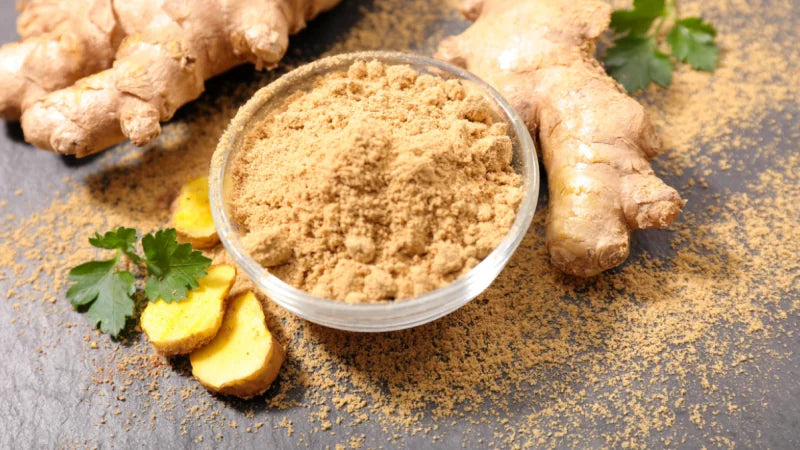
Verifying these benefits, multiple studies have corroborated that a routine intake of ginger can remarkably lessen muscle pain and soreness, making it an efficacious antidote for post-exercise muscle discomfort.
Perhaps you’ve caught the common cold or flu? Ginger, packed with immune-boosting antioxidants, proves to be a formidable ingredient to combat these irritants, while also possessing anti-nausea properties beneficial for morning sickness and travel sickness.
In addition, when it comes to a persistent cough or a slight nip in the air causing discomfort to your throat, nothing compares to a soothing beverage infused with ginger - a testament to its ability to fight throat infections.
Those who think they have no time for healthy eating will sooner or later have to find time for illness.
- Edward Stanley
Add to this the crucial role it has emerged to play in managing osteoarthritis, lowering cholesterol levels, and providing relief in menstrual pain, there’s no denying why this root is an essential part of wellness regimes worldwide.
Apropos of more serious health issues, ginger’s benefits seem to extend much beyond soothing ailments. An impressive body of research has started to shed light on ginger's potential role in preventing heart disease.
Further, there's a growing conversation around ginger's potential to inhibit the growth of different types of bacteria, making ginger a fascinating area of exploration in the realm of alternative medicine.
Whilst the health benefits of ginger are bountiful, it's essential to remember that moderation is key. Like any food substance, ginger has its limitations and should be consumed within recommended amounts.
What is Turmeric and its Benefits
Turmeric is a spice belonging to the ginger family often used in Asian cuisine.
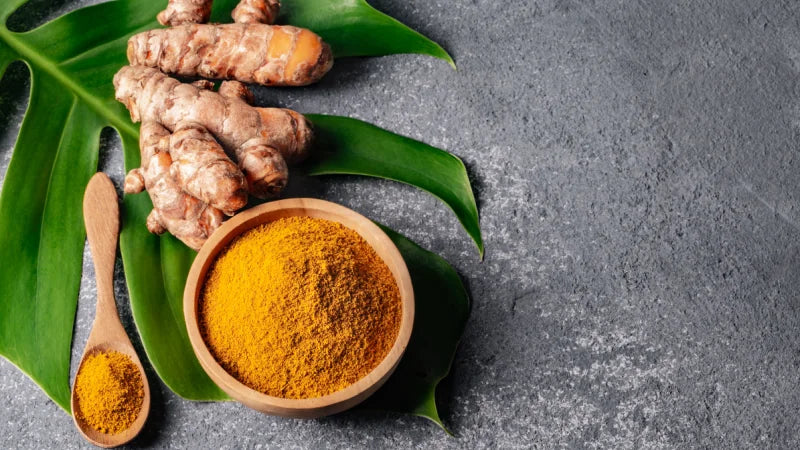
Before digging into the benefits of turmeric, let's first understand what it is and why it's considered a golden spice.
Its vibrant yellow hue, which adds a golden touch to dishes, is thanks to a compound known as curcumin.
And while its culinary applications are well-appreciated, turmeric's true value lies in its health-promoting properties.
Nature itself is the best physician.
- Hippocrates
For centuries, turmeric has been used in traditional medicine for its potent anti-inflammatory effects. It possesses robust antioxidants that neutralise harmful free radicals that can wreak havoc on your health—giving it a reputation as a fantastic spice for overall well-being.
Furthermore, curcumin, turmeric's active compound, is also studied for its potential anticancer properties.
Incorporating turmeric into your diet isn't as technical as it may sound. It can be as simple as adding a pinch of ground turmeric into your morning smoothie, sprinkling it over your cooked vegetables, or whisking it into your favourite soup.
For a comforting beverage, try preparing a golden milk latte—a blend of warm milk, turmeric, and a hint of sweetener. The flavour enhances, and your health stands to benefit.
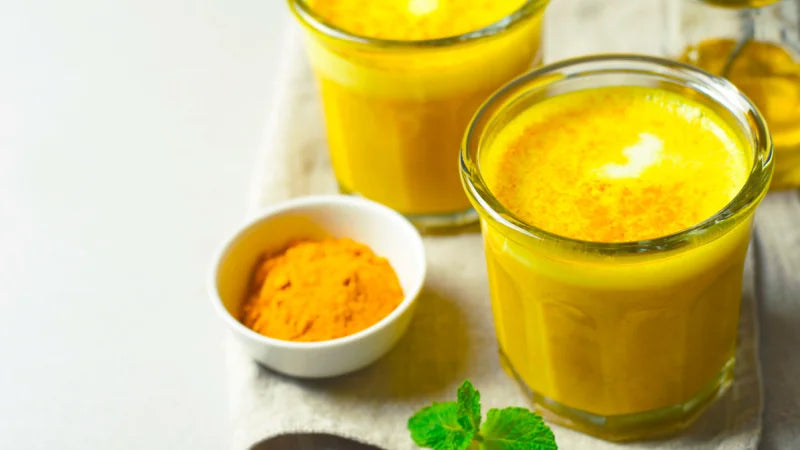
When introducing turmeric into your diet, it's important to remember to pair it with black pepper. You might be wondering why, right?
Piperine, the active ingredient in black pepper, enhances curcumin absorption in the body by an astonishing 2000%. That's quite a dip to leave on the table if you're consuming turmeric without pepper!
However, while turmeric is generally safe for most people, it's important to consume it in moderate amounts. High doses or long-term use may cause gastrointestinal problems in some people.
Especially if you're pregnant, nursing, have gallbladder problems or are on medication, it's always wise to consult a healthcare professional before tweaking your diet significantly.
In conclusion, the golden spice turmeric, with its anti-inflammatory and antioxidant properties, offers an array of health benefits. But remember, it's not magic—it's science!
7 Ways to Add Ginger to Your Diet
Whether you're a food lover, a health enthusiast, or even a novice in the kitchen, there are easy and versatile ways to add ginger to your usual diet.
Here are some ideas to get you started:
- Morning Beverages: Start your day with a soothing cup of ginger tea. Alternatively, a ginger-infused smoothie can be an easy way to wake up your taste buds.
- Flavourful Curries: Ginger can intensify the depth of flavour in your curries, giving them an intriguing twist. Just the right touch can transform the mundane into the exotic.
- Healthy Stir-fries: Adding ginger to your stir-fries imparts a bit of spice and bite, enhancing the overall taste.
- Baked Goods: Allowing the warm tones of ginger to permeate your freshly baked goods not only boosts their flavour but also their nutritional profile.
- Zesty Dressings: A few pinches of ginger in your salad dressing can make a world of difference. Give it a try!
- Sweet Treats: Believe it or not, ginger works spectacularly well in desserts, delivering a spicy counterpoint to sweetness.
- Refreshing Beverages: Add a few slices of fresh ginger into your drinks for a kick of refreshing spice. Perfect for those long, languid summer afternoons.
Often overshadowed by its more well-known cousin, turmeric also holds a treasure trove of health benefits. From boosting immunity to alleviating inflammation, this golden spice can work wonders when integrated into your diet.
7 Ways to Add Turmeric to Your Diet
Bringing turmeric into your daily consumption isn't as challenging as it may seem, and the myriad health benefits on offer make it well worth the effort.
Here are seven creative yet practical ways to infuse this golden spice into your everyday meals:
- Golden Milk: Traditionally known as 'Turmeric Latte,' this powerhouse drink can be made by simply warming milk and stirring in turmeric powder. To enhance the taste, you could also add honey, cinnamon, or vanilla extract. It's a delicious, soothing, and immune-boosting delight.
- Spice Blends: A pinch of turmeric can be included in homemade spice mixes, such as curry powder or garam masala. Use these blends to season your vegetables, meat, or other savoury dishes.
- Soups: A teaspoon of turmeric powder adds a hearty flavour and vibrant hue to your soups. It complements a wide variety of ingredients, thereby broadening your palette without compromising on health.
- Savoury Breakfasts: Whether you're making scrambled eggs, an omelette, or a frittata, a sprinkle of turmeric can brighten the dish with minimal effort, while potentially reducing inflammation and improving your digestive health.
- Turmeric Tea: A comforting cup of turmeric tea has myriad health perks. Just boil water, add fresh turmeric root (or use turmeric powder), and let it simmer. Strain the tea into a cup, sweeten it with honey, and squeeze in a bit of fresh lemon juice for an additional vitamin C punch.
- In Rice: Imparting a lovely yellow shade and subtle flavour to rice, turmeric can be added during the cooking process. It pairs especially well with coconut and forms the base for many Asian dishes.
- Roasted Veggies: Drizzle turmeric, along with olive oil and salt on your vegetables before placing them in the oven. You'll be rewarded with a delightful array of antioxidants and anti-inflammatory compounds with every bite.
The Science Behind Ginger and Turmeric and Why They Work
We often extol the virtues of ginger and turmeric, but what is the science behind them? Why are they so effective in promoting health?

Ginger contains compounds known as gingerols and shogaols that have powerful antioxidant and anti-inflammatory effects. These compounds are effective in managing symptoms related to gastrointestinal issues, such as nausea and vomiting, and can provide relief from symptoms of arthritis as well.1
Although turmeric's primary compound is curcumin, it is not the only compound present. Several other curcuminoids and turmerones also contribute to its health benefits.
He who takes medicine and neglects to diet wastes the skill of his doctors.
- Chinese Proverb
Curcumin, in particular, has shown promising effects in reducing inflammation, managing oxidative stress, and improving symptoms of chronic diseases like diabetes and cancer.
Unlike most other spices, curcumin's absorption in the gut is rather low. To increase absorption, pairing turmeric with black pepper, which contains piperine, is often recommended.23
Ginger and turmeric have also exhibited neuroprotective properties, potentially helpful in slowing the development of neurodegenerative diseases such as Alzheimer’s and Parkinson’s. Research supports that neuroinflammation plays a fundamental role in the development of these diseases, and the anti-inflammatory properties of both these spices may be beneficial in this context.4
Keep in mind two human bodies are not the same so it may work differently for you. As a best practice, it’s best to speak with your healthcare provider before starting.
The Anti-Inflammatory Power of Ginger and Turmeric
Perhaps, you've heard of the anti-inflammatory prowess of ginger and turmeric. Unsurprisingly, it is indeed their most well-regarded benefit.
Chronic inflammation is an underlying factor in many diseases such as diabetes, arthritis, cancer, and heart disease. Ginger and turmeric, however, have demonstrated effective results in managing inflammation.
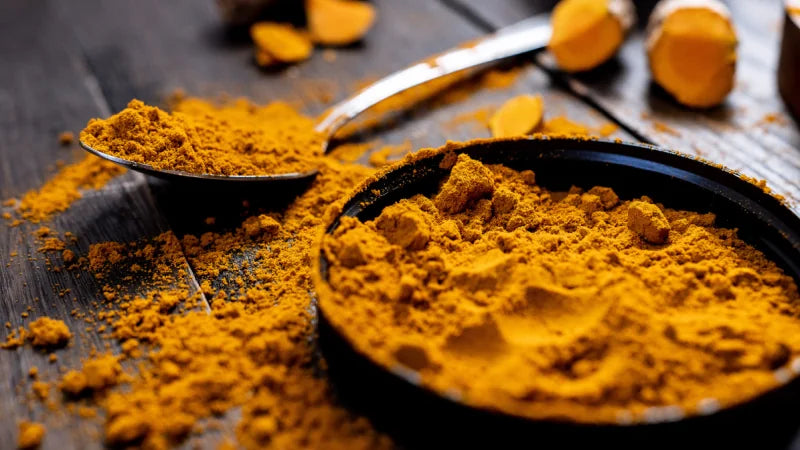
For instance, ginger has compounds like gingerols and shogaols that have anti-inflammatory and antioxidant effects. A 2014 study found that these compounds inhibited the production of inflammatory markers, leading to reduced systemic inflammation (source).
Subsequently, we turn to turmeric, celebrated for the compound curcumin. Broadly studied, it also has anti-inflammatory and antioxidant properties. A 2017 review established that curcumin competes with inflammatory chemicals in the body, therefore decreasing inflammation (source).
The doctor of the future will no longer treat the human frame with drugs but rather will cure and prevent disease with nutrition.
- Thomas Edison
Numerous studies indicate that combining turmeric and black pepper enhances curcumin absorption in the body. A 2017 study showed a 20-fold increase in bioavailability when combined (source).
One could ponder, "What does this mean for me?" In simple terms, increased intake of ginger and turmeric could help manage inflammatory conditions and reduce their risk.
But does this mean you should ditch your meds and go all-natural?
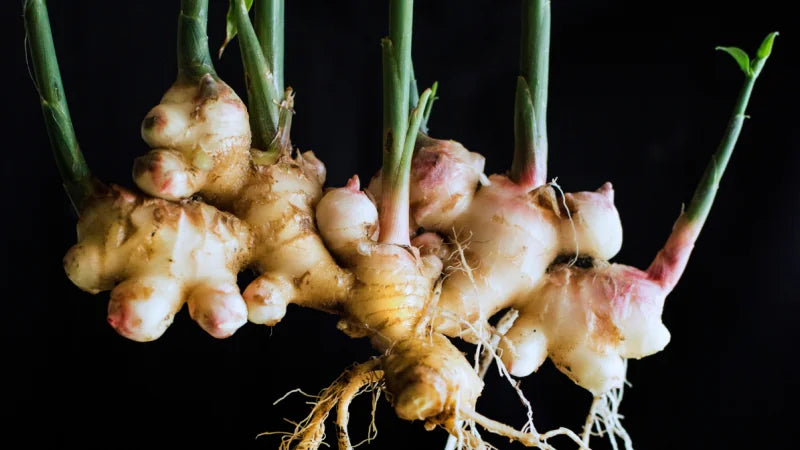
This brings us to a crucial point: While ginger and turmeric provide copious health benefits, they shouldn’t be seen as a complete substitute for medical treatment. Instead, think of them as companions to traditional medicine under your doctor's advice.
If you’re considering the addition of these spices to your diet, we advise starting small and observing how your body reacts. If you’re taking medications for inflammatory conditions, it’s best to consult with your healthcare provider before making substantial changes to your routine.
Debunking Myths About Ginger and Turmeric
In an ocean of information, it can be difficult to separate facts about ginger and turmeric from persisting myths.
Let us set the record straight.
Myth 1: Ginger and Turmeric Only Provide Digestive Benefits
While it is true that both ginger and turmeric are renowned for their digestive benefits, they offer more. Studies suggest ginger may reduce muscle soreness and pain, lower the risk of infections, and even improve brain function [source]. Similarly, turmeric is not just a digestive aid, it may also improve heart health, reduce symptoms of depression and potentially protect against certain types of cancer [source].
Myth 2: Powdered Ginger and Turmeric Are Less Effective Than in Raw Form
Raw and powdered forms of these spices have diverse benefits and uses. For instance, powdered ginger may suppress cancer growth more effectively, while raw ginger may offer superior anti-inflammatory effects [source]. On the other hand, curcumin, the beneficial compound in turmeric, is more readily available in its powdered form [source].
Myth 3: Golden Milk is the Best Way to Take Turmeric
Despite its popularity, golden milk is not the only beneficial way to consume turmeric. It can also be taken in the form of tea, capsules, or even as a spice in cooking [source].
Education is fundamental in reaping the full health benefits of ginger and turmeric. We encourage you to distinguish between fact and myth and make these spices a part of your daily regimen in a manner that suits you best.
Safety and Precautions when Using Ginger and Turmeric
While introducing ginger and turmeric to your dietary regimen has copious health benefits, we must heed certain safety precautions and potential concerns.
You should always consult with your healthcare provider before starting any new supplement, particularly if you have pre-existing conditions or are on other medications.
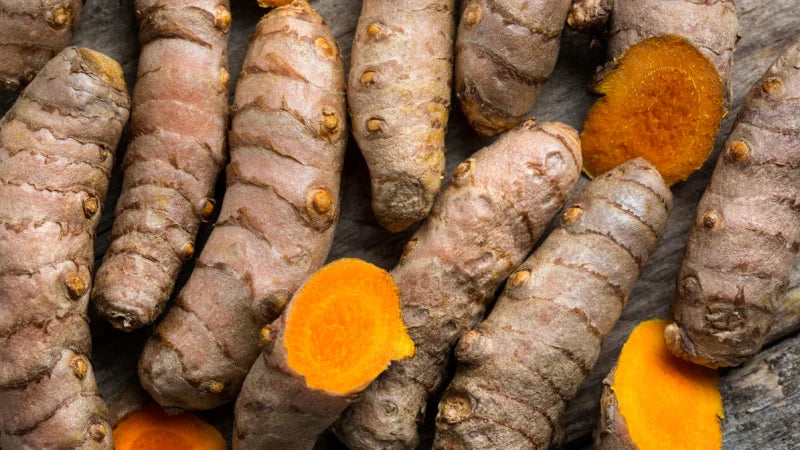
Ginger, although typically safe to consume, may cause some side effects, including heartburn, stomach upset, and mouth irritation. According to research from the Mayo Clinic, these side effects are usually related to powdered ginger consumption in large quantities (Mayo Clinic, ND).
On the other hand, consuming high doses of turmeric may lead to stomach discomfort and ulcers. Further, turmeric might slow blood clotting, so users on blood-thinner medication or nearing surgery should be cautious (WebMD, ND).
Moreover, those suffering from gallbladder disease should avoid using both spices as they can exacerbate the condition. This claim is substantiated by several medical professionals, including those from Penn Medicine (Penn Medicine, 2019).
Allergies to these spices, although uncommon, can occur. So, be sure to seek medical advice in the event of unexpected or adverse reactions occurring (Healthline, 2017).
Always start with small doses when incorporating these spices into your regimen, seeking medical advice where necessary to ensure these additions serve to enhance your health optimally.
What is the origin of ginger?
Ginger, revered worldwide for its numerous health benefits, found its early roots in Southern Asia. Historically, it has been an integral part of numerous Asian cultures for over 5,000 years due to its medicinal properties.
From there, it spread to the rest of the world, most notably the Roman Empire, through the distinguished spice routes.
Today, India, China, Indonesia, and Nigeria stand as the principal producers of this beneficial root, contributing to its ever-present role in global cuisine and traditional medicine.
What is the history of turmeric?
Tracing its roots back over 4,000 years, turmeric has a rich and diverse history. Originating in Southeast Asia, it's revered as a sacred spice in many spiritual traditions, particularly within Hinduism and Buddhism.
Throughout history, turmeric has not only been used in the kitchen but also as a potent and effective medicinal tool in Ayurvedic and Chinese medicine.
Known for its vibrant, golden hue, it was often utilised as a dye for fabrics and a part of various beauty regimens.
With its global recognition, turmeric's intriguing history has indeed stamped its golden mark on human civilisation.
Can I consume ginger and turmeric together?
Indeed, not only can you consume ginger and turmeric together, but doing so may amplify their respective wellness benefits.
These remarkable spices complement each other excellently, with ginger's zesty tang blending harmoniously with the earthy warmth of turmeric.
When consumed together, the compound curcumin found in turmeric and the compound gingerol in ginger form a nutrient-rich power duo.
The integration of these vibrant spices into your diet can be as simple as adding them to a warming curry, incorporating them into a refreshing smoothie, or brewing them into a soothing tea.
Just remember, absorption of these beneficial components can be greatly enhanced by consuming them with fats or with black pepper.
Can ginger and turmeric help with weight loss?
Indeed, ginger and turmeric can play a supportive role in your weight loss journey. Compounds in both spices have been studied for their potential to boost metabolism, promote feelings of fullness, and enhance fat burning.
However, these spices must be coupled with a balanced diet and regular exercise for optimum effects.
Ginger's 6-gingerol content, a compound associated with anti-obesity effects, has been revealed to encourage the feeling of satiety. Therefore, it can help control your calorie intake, subsequently contributing to weight loss (source).
On the other hand, turmeric's active component, curcumin, is also touted for weight management. It may inhibit the growth of fat cells, which may consequently lead to weight loss. However, studies are still ongoing to robustly substantiate these claims (source).
Although ginger and turmeric can support weight loss, it's essential to remember that they aren't magical solutions. Weight management is a complex process that involves diet, exercise, and often, changes in lifestyle. As always, consult with your healthcare provider before incorporating any significant dietary changes.
What is the nutritional value of ginger and turmeric?
Both ginger and turmeric can lend a considerable wealth of nutritional value to your diet. A one-gram portion of ginger can provide a multitude of benefits including magnesium, vitamin B6, and dietary fibre.
It also packs in potent antioxidant properties which combat inflammation and oxidative stress in your body. You can view the complete nutritional profile of ginger here.
Meanwhile, turmeric with about 29 calories per tablespoon, it equips you with iron, potassium, vitamin B6, and dietary fibre. It's also the bearer of a unique compound known as curcumin, well-regarded for its powerful anti-inflammatory and antioxidant benefits.
Find the full nutritional breakdown of turmeric here.
Can ginger and turmeric be used in skincare?
Ginger and turmeric possess properties that make them beneficial for skincare. Ginger, with its antioxidant properties, can help to preserve your skin's collagen, making it smoother and firmer.
It also has anti-inflammatory and antiseptic properties which can help to alleviate acne and other related skin issues.
Turmeric, on the other hand, is known for its natural anti-inflammatory and antioxidant properties, along with its ability to fight off acne. Turmeric's anti-inflammatory qualities can target your pores and calm the skin, thereby aiding in reducing scarring from acne (source).
Beyond this, studies indicate that turmeric may help reduce the impact of skin conditions such as psoriasis, eczema, and dermatitis due to its anti-inflammatory properties (source).
Additionally, the curcumin found in turmeric may assist in protecting the skin from damage caused by the sun, pollution, and other environmental factors. Not to forget, it may also improve skin elasticity, reducing the appearance of wrinkles (source).
Dermatologists often recommend these natural ingredients as part of a holistic skincare routine. However, bear in mind that, like all products, everyone may react differently and thus it is important to perform a skin patch test before commencing regular usage.
Are ginger and turmeric safe for everyone?
Ginger and turmeric safety differ for every individual and is largely considered secure, yet precautions should be maintained for certain subsets of the populace.
While generally adopted as harmless, both ginger and turmeric can interact with particular medications or conditions, potentially yielding unwanted effects.
We refer you to WebMD where they report that excessive ginger consumption may thin your blood, increasing the risk of bleeding in individuals who take anticoagulants, have bleeding disorders, or are scheduled for surgery (source).
Turmeric, in a similar vein, might slow blood clotting which suggests caution for individuals with blood disorders (source).
Turmeric may additionally have adverse effects on individuals with diabetes as it can drop blood sugar levels too low, creating hypoglycemia. It's also worth considering that it may interfere with diabetes medication (source).
For pregnant and breastfeeding women, ginger is safe to consume in food amounts, but it's better to avoid medicinal quantities. Although additional research is needed, some studies suggest high doses could risk miscarriage (source).
Turmeric is likely safe if consumed in food, but the usage of medicinal amounts during pregnancy could stimulate the uterus or encourage the menstrual period leading to a heightened risk of miscarriage (source).
What is the Best Turmeric Supplement in the UK?
Dietapplements' products with turmeric are chock-full of high-quality ingredients, potent turmeric and added black pepper extract to enhance absorption.
We don't have just pure turmeric supplements. We have innovated and perfected formulas, and complexes with 10 and even 25 ingredients in each capsule.
The bioactive compounds present are beneficial for your overall health, and they’re packed in easy-to-swallow capsules.
What sets Dietapplements apart from the crowd is its commitment to purity and quality. With no unnecessary additives, it's pure turmeric goodness in every capsule – now that's value for your hard-earned quid!
Plus, every product is expertly made in the UK, ensuring top-notch, homegrown quality.
So, if you're on the hunt for the best turmeric supplement, you can bank on Dietapplements! They’ve got your health at heart, making your wellness journey easy.
Simplify Your Ginger and Turmeric Diet With Dietapplements Clean Supplements
Glucosamine and Chondroitin Complex Capsules
At Dietapplements we believe in delivering products that enhance your health naturally. Our Glucosamine and Chondroitin Complex Capsules are no exception, and we've included two powerful ingredients – ginger and turmeric.
For centuries, these perfect companions have been used for the range of health benefits they offer. Our capsules provide these remarkable benefits, plus more, in a compact and convenient form.
The ginger in our complex capsules contributes to a host of wellness advantages, from reducing inflammation and nausea to aiding digestion and mitigating muscle pain.
When it comes to turmeric, this golden spice imparts potent benefits. It's rich in Curcumin, a compound that's been proven to reduce inflammation and combat a whole host of diseases.
The inclusion of turmeric gives our capsules a salubrious boost, ensuring you're receiving the best wellness support possible.
Taking these capsules couldn't be easier! This is your way of incorporating the goodness of ginger and turmeric into your daily regimen without needing to worry about meal prep or cooking. Just one capsule a day, and you've gifted your body the innumerable virtues of these two incredible spices.
While both ginger and turmeric are generally safe for consumption, we recommend you consult with your healthcare provider before beginning any supplement regimen. It is particularly important when you have any underlying health conditions or are taking regular medication.
In the quest for holistic and natural health solutions, our Glucosamine and Chondroitin Complex Capsules, backed by the formidable power of ginger and turmeric, are an ideal choice. We welcome you to experience this incredible synergy of health and well-being for yourself.
Apple Cider Vinegar, Turmeric & Blueberries BioCultures
Among the array of natural health supplements by Dietapplements, their Ginger and Turmeric blend stands out. This potent combination is part of their Apple Cider Vinegar, Turmeric & Blueberries BioCulturesproduct.
Infused with beneficial probiotics, it combines the advantages of ginger and turmeric with the power of apple cider vinegar and antioxidant-rich blueberries to create a holistic approach towards wellness.
These ingredients come together in uniquely crafted capsules to offer a superfood experience designed to support your everyday health.
The ginger element of this product provides a healthful spin, loaded with bioactive compounds known for their anti-inflammatory and antioxidant effects. Gingery goodness invigorates the formula, reinforcing the body's immune responses and aiding digestion.
Then there's turmeric, the vibrant spice known for its numerous health benefits, not least its powerful anti-inflammatory and antioxidant properties.
Curcumin, the active ingredient found in turmeric, couples with black pepper extract in the blend, enhancing its absorption and effectiveness.
This golden component not only contributes to this supplement's striking appearance but also bolsters its health benefits.
Alongside the synergistic properties of apple cider vinegar and bioactive cultures, Dietapplements' capsule blend goes a long way to offer a well-rounded approach to maintaining good health with age-old natural remedies right in the mix.
Why not allow ginger and turmeric to play a role of some importance in your health regimen, starting today?
Raw, Unfiltered Apple Cider Vinegar with the Mother
We at Dietapplements understand that incorporating ginger and turmeric into your daily regimen might seem daunting.
And have a perfect solution to ensure you reap the maximum health benefits with minimal fuss. Introducing our raw, unfiltered Apple Cider Vinegar with the Mother, designed specifically to cater to your health and wellness needs.
This unique product contains a powerful combination of nutrient-rich apple cider vinegar, potent turmeric extract, and vitamins designed to support your body's natural versus.
Our apple cider vinegar with turmeric is a one-stop solution to harnessing the potential of both these superfoods.
Turmeric, celebrated for its anti-inflammatory and antioxidant properties globally, is complemented beautifully by ginger's wide range of health benefits, such as soothing digestive issues and reducing chronic pain.
Our commitment to quality and cleanliness ensures that our product is free of questionable additives and artificial ingredients. This means you can trust what you're putting in your body.
Rest assured, we uphold the highest standards in sourcing, testing, and production when it comes to our supplements.
Our Apple Cider Vinegar, Turmeric and Blueberries BioCultures product ingeniously incorporates the health-boosting effects of ginger and turmeric into a convenient supplement that you can take daily for maximum effect.
A pinch of health, a dollop of wellness, and a sprinkle of good life is what we promise you with our Raw, Unfiltered Apple Cider Vinegar with the Mother.
Curious?
Explore more about the product on our website and begin your journey towards a healthier, happier lifestyle with us.
Recommended reading: Complete guide to best collagen and biotin supplements in the UK.
















